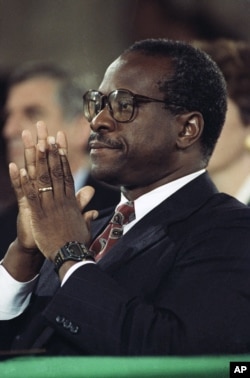The U.S. Senate appears to be moving toward a final showdown over the nomination of Judge Brett Kavanaugh, President Donald Trump’s choice to replace retired Justice Anthony Kennedy on the Supreme Court.
Kavanaugh’s nomination was thrown into turmoil after a California professor, Christine Blasey Ford, alleged that he sexually assaulted her at a house party when they were both teenagers in the 1980s. Kavanaugh has denied the allegation.
Thomas confirmation
The Kavanaugh battle recalls another high stakes drama that riveted the country nearly 27 years ago.
In 1991, President George H.W. Bush nominated Clarence Thomas to the Supreme Court. But during confirmation hearings before the Senate Judiciary Committee, law professor Anita Hill testified that Thomas had sexually harassed her when they worked together in previous government jobs.
Thomas denied the allegations and condemned the inquiry during nationally televised hearings that riveted the country.
“As a black American, as far as I am concerned, it is a high-tech lynching for uppity blacks who in any way deign to think for themselves,” Thomas told the committee.
Even though Thomas was narrowly confirmed, the political fallout from the contentious hearing had an impact for years to come.
Many women around the country were outraged at how the all-male Senate Judiciary Committee grilled Hill about the allegations, and some of them wound up running for Congress the next year.
Year of the woman
The following year, 1992, became known as The Year of the Woman after numerous women candidates were elected to Congress, including several in the Senate where Hill had confronted Thomas. In 1991, there were only two women in the Senate. Today there are 23 and this year has seen a record number of women running for Congress.
Among those elected to the Senate in 1992 was Democrat Patty Murray of Washington.
“I am a United States senator today because of the way Anita Hill was treated in 1991,” Murray told reporters at the Capitol this week. “Women are watching. We are not going to allow that to happen again.”
Anita Hill told ABC’s Good Morning America program that she has been closely watching the Kavanaugh nomination fight. She urged the Senate to pause as it moves toward a vote on Kavanaugh and have the FBI do a thorough investigation of Ford’s allegation regarding Kavanaugh.
“We are talking about an appointment for a lifetime on this nation’s highest court making decisions that are going to affect Americans probably for decades,” Hill said.
A new reality
Nearly three decades later, echoes of the Anita Hill-Clarence Thomas showdown still resonate in the #MeToo movement where numerous women have come forward to call out the behavior of many powerful men.
“I think we can trace that movement in many ways to the anger that came out of the Anita Hill-Clarence Thomas hearings during Clarence Thomas’ confirmation process,” said George Washington University legal expert Paul Schiff Berman.
Republicans want to hear from both Ford and Kavanaugh about the alleged assault, either in a public or private hearing.
Senate Republican leader Mitch McConnell has complained that the Democrats are just looking for ways to slow down and stop Kavanaugh’s appointment.
“The ranking member (top Democrat) of the Judiciary Committee had notice of this for quite some time and decided to spring it right at the end and it is pretty obvious this is all about delaying the process,” McConnell said.
Politicized process
If confirmed, Kavanaugh would be President Trump’s second appointment to the Supreme Court following the confirmation of Justice Neil Gorsuch last year. If confirmed, Kavanaugh would solidify a conservative majority on the high court, long a goal of the conservative movement dating back to the time of President Ronald Reagan in the 1980s.
Trump also sees the Democrats playing politics with the Kavanaugh nomination.
“They just resist and they just obstruct. And frankly, I think they are lousy on policy and in many ways, they are lousy politicians,” Trump said.
On a broader level, some analysts see the battle over Kavanaugh as the latest example of how polarized politics has paralyzed Washington.
“And it is unfortunate as a country, because the Supreme Court, if handled properly, should be immune from these things,” said conservative analyst Jamil Jaffer of the Antonin Scalia Law School at George Mason University. “We should be confirming people who are qualified in the 90s (out of 100 votes) and we should be letting them do their job, which is not to set policy but instead to say what the law is.” Jaffer was a guest on VOA’s Press Conference USA.
And so, as a divided Senate prepares to render a judgment on Kavanaugh, perhaps as early as next week, many Americans may have the feeling that they have seen this drama play out before.









